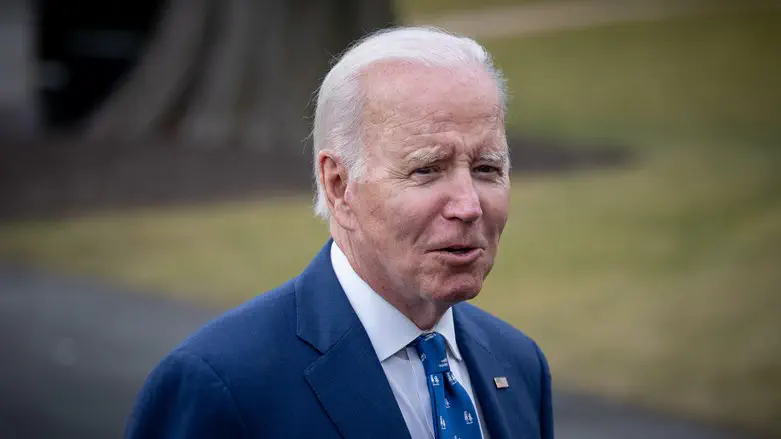
A group of 20 senators from the Democratic Party on Wednesday sent a letter to US President Joe Biden in which they expressed their support for normalization between Israel and Saudi Arabia, but demanded that the agreement not include a defense pact or an agreement to Saudi Arabia having a civilian nuclear program.
The letter was spearheaded by Senator Chris Murphy (D-CT), Senator Chris Van Hollen (D-MD), Senate Majority Whip Dick Durbin (D-IL) and Senator Peter Welch (D-VT).
“Peace between Israel and its neighbors has been a longstanding goal of US foreign policy, and we are maintaining an open mind about any agreement that would potentially deepen the political, cultural and economic ties between Saudi Arabia and Israel,” wrote the senators. “As the Administration pursues negotiations to achieve an agreement that may require Senate action, we write to share our views on the parameters of any potential proposal that aligns with US security goals and advances your stated goals for long term peace, stability and justice in the region.”
The senators laid out their concerns with Saudi Arabia’s reported requests of the United States for the normalization agreement.
On a potential security guarantee in a region where the US has long refrained from committing to treaty-backed security guarantees, the senators wrote, “A high degree of proof would be required to show that a binding defense treaty with Saudi Arabia – an authoritarian regime which regularly undermines US interests in the region, has a deeply concerning human rights record, and has pursued an aggressive and reckless foreign policy agenda – aligns with US interests, especially if such a commitment requires the US to deploy substantial new permanent resources to the region.”
On the reported Saudi request for US support to develop a civilian nuclear program and to purchase more advanced US weaponry, they wrote, “While we should seriously consider whether it is in US interests to help Saudi Arabia develop a domestic nuclear program, we should always maintain the high bar of the ‘gold standard’ 123 Agreement and insist on adherence to the Additional Protocol. And as the devastating war in Yemen has shown, the provision of more advanced weaponry to Saudi Arabia should be done with careful deliberation to ensure that such equipment only be used for truly defensive purposes and does not contribute to a regional arms race.”
The senators also opined that a Saudi-Israeli normalization agreement should preserve the option of a “two-state solution” and outlined the elements that should be included in any agreement in order to do so.
“To the extent the United States is considering the precedent-breaking upgrade to our security relationship with Saudi Arabia outlined above as part of a comprehensive security and recognition agreement between Israel, Saudi Arabia, and the United States, the agreement should include meaningful, clearly defined and enforceable provisions to achieve your stated objective of preserving the option of a two-state solution to the Israeli-Palestinian conflict and to ensuring that there be “equal measures of dignity and security” for both Israelis and Palestinians.”
“This should include, among other measures, a commitment by Israel not to annex any or all of the West Bank; to halt settlement construction and expansion; to dismantle illegal outposts (including those that have been retroactively ‘legalized’); and to allow the natural growth of Palestinian towns, cities and population centers and the ability to travel without interference between and among contiguous Palestinian areas. These elements are essential to any sustainable peace in the Middle East and to preserving Israel’s own future as a Jewish, democratic state,” they wrote.
The senators concluded, “As the parties make requests of the US throughout your discussions, we hope that you will also seek commitments from them with respect to actions they can take to further US national security interests and peace and stability in the region. We appreciate your commitment to this important initiative and ask that you keep us regularly apprised of developments.”
Last Friday, US National Security Council Spokesman John Kirby told reporters that a “basic framework” was in place for a potential deal between Israel and Saudi Arabia, but also said, “We’re continuing to work at this…until you negotiate everything, you haven’t really negotiated anything final.”
On Tuesday, Deputy State Department spokesperson Vedant Patel poured cold water on the idea that a normalization agreement between Israel and Saudi Arabia is near, saying there is still work to be done.
Meanwhile, sources told Reuters last week that Saudi Arabia is determined to secure a military pact requiring the United States to defend the kingdom in return for opening ties with Israel and will not hold up a deal even if Israel does not offer major concessions to Palestinian Arabs.
While an Israeli-Saudi deal is widely expected to include Israeli concessions towards the Palestinian Authority, and Secretary of State Antony Blinken recently said that the Palestinian Arab issue will be part of a normalization agreement, three sources told Reuters that the Palestinian Arab core demand for statehood would take a back seat.
